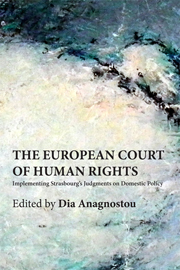Book contents
- Frontmatter
- Contents
- The contributors
- Acknowledgements
- Introduction: Untangling the domestic implementation of the European Court of Human Rights' judgments
- Part I INSTITUTIONAL DYNAMICS OF DOMESTIC IMPLEMENTATION
- Part II LEGAL MOBILISATION AND THE POLITICAL CONTEXT OF IMPLEMENTATION
- 4 European human rights case law and the rights of homosexuals, foreigners and immigrants in Austria
- 5 Political opposition and judicial resistance to Strasbourg case law regarding minorities in Bulgaria
- 6 Under what conditions do national authorities implement the European Court of Human Rights' rulings? Religious and ethnic minorities in Greece
- 7 A complicated affair: Turkey's Kurds and the European Court of Human Rights
- 8 The European Court of Human Rights and minorities in the United Kingdom: catalyst for change or hollow rhetoric?
- 9 Politics, courts and society in the national implementation and practice of European Court of Human Rights case law
- List of European Court of Human Rights judgments and European Commission on Human Rights cases
- Index
8 - The European Court of Human Rights and minorities in the United Kingdom: catalyst for change or hollow rhetoric?
from Part II - LEGAL MOBILISATION AND THE POLITICAL CONTEXT OF IMPLEMENTATION
Published online by Cambridge University Press: 05 April 2014
- Frontmatter
- Contents
- The contributors
- Acknowledgements
- Introduction: Untangling the domestic implementation of the European Court of Human Rights' judgments
- Part I INSTITUTIONAL DYNAMICS OF DOMESTIC IMPLEMENTATION
- Part II LEGAL MOBILISATION AND THE POLITICAL CONTEXT OF IMPLEMENTATION
- 4 European human rights case law and the rights of homosexuals, foreigners and immigrants in Austria
- 5 Political opposition and judicial resistance to Strasbourg case law regarding minorities in Bulgaria
- 6 Under what conditions do national authorities implement the European Court of Human Rights' rulings? Religious and ethnic minorities in Greece
- 7 A complicated affair: Turkey's Kurds and the European Court of Human Rights
- 8 The European Court of Human Rights and minorities in the United Kingdom: catalyst for change or hollow rhetoric?
- 9 Politics, courts and society in the national implementation and practice of European Court of Human Rights case law
- List of European Court of Human Rights judgments and European Commission on Human Rights cases
- Index
Summary
Human rights are not an ideology or a thought system: they are more a matter of praxis than of logos. To have any meaning in the lives of individuals and communities, they must be embedded in practice. A judgment of the European Court of Human Rights is not an end in itself, but a promise of future change, the starting point of a process which should enable the rights and freedoms to be made effective.
The United Kingdom can generally be seen as a dependable defender of human rights and civil liberties. A particularly vibrant legal activist community is dedicated to protecting individual rights, and efforts to protect those rights are routinely made by both state and non-state actors. There are instances, though, in which the UK is found to violate the European Convention on Human Rights (ECHR) and is faced with the decision of how best to implement the corresponding judgments of the European Court of Human Rights (hereafter ECtHR or the Court). The implementation of the ECtHR's judgments can be a quick and easy process or it can be long and laborious, depending on the circumstances surrounding the individual case and the general and individual measures required to compensate the violation. Data from the UK and the other eight countries analysed in the present volume provide a glimpse into the rates of implementation and the time taken by respective governments to do so.
- Type
- Chapter
- Information
- The European Court of Human RightsImplementing Strasbourg's Judgments on Domestic Policy, pp. 188 - 210Publisher: Edinburgh University PressPrint publication year: 2013



